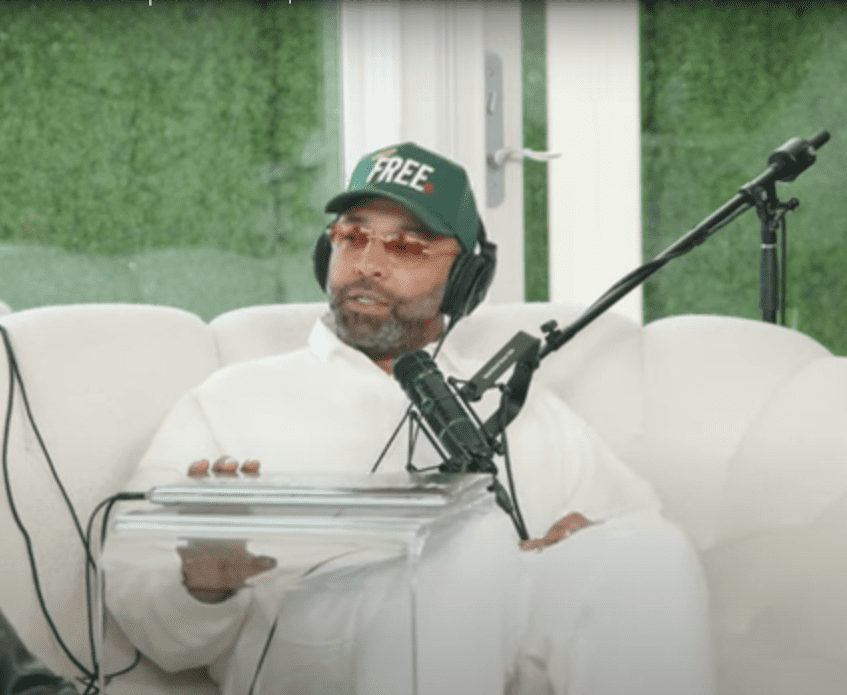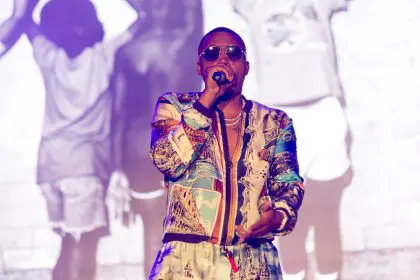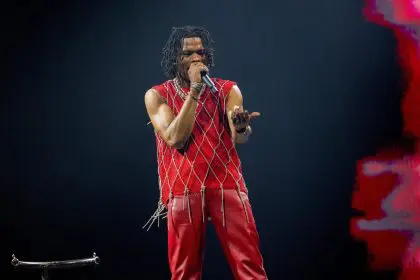Joe Budden is taking Drake to task for what he sees as manufactured tough-guy behavior during a recent Toronto Raptors and Sacramento Kings NBA matchup. The podcast host and former rapper’s criticism has ignited discussions about celebrity conduct in professional sports venues.
During the game, Drake, who serves as the Raptors’ global ambassador, directed intense trash talk toward Kings player DeMar DeRozan. Budden found particular comedic value in what he described as Drake’s exaggerated facial expressions and posturing. Referring to them as the “duck lips of death,” and emphasized that such antics were unbecoming. “Don’t come to my game and cut eyes at me, my n-——- I’ll throw this ball at you,” he said. This playful yet pointed critique highlights the absurdity of the situation, as Budden questioned why Drake felt the need to act tough in a sports setting.
The incident marks another chapter in the ongoing narrative where hip-hop culture and professional basketball intersect. Budden addressed the situation on his podcast, suggesting Drake’s behavior stemmed from deeper issues related to handling conflict rather than genuine sports rivalry.
DeRozan has maintained his composure throughout the situation. In comments to the Sacramento Bee, the Kings star emphasized his continued friendship with Drake while acknowledging the entertainment aspect of the situation. His measured response highlights the delicate balance between maintaining professional relationships and navigating public spectacle.
The courtside drama carries additional weight given the current climate in hip-hop. Drake’s reaction may have been influenced by Kendrick Lamar’s recent release “Not Like Us,” which features DeRozan in its music video. This connection adds layers to what might otherwise be dismissed as typical courtside celebrity behavior.
Drake’s role as Raptors ambassador places him in a unique position where his actions carry additional scrutiny. His official connection to the team means his courtside conduct reflects not just on him personally but on the organization as a whole.
The situation escalated when Kings owner Vivek Ranadive responded by wearing a sweatshirt with the phrase “They Not Like Us,” a direct reference to Lamar’s track. This move transformed what began as courtside tension into a broader cultural moment spanning sports, music and social media.
The incident demonstrates how quickly basketball court dynamics can evolve into cultural talking points. As the lines between sports, entertainment and social media continue to blur, such interactions become instant fodder for commentary and criticism.
Budden’s analysis particularly resonates because of his unique position straddling both hip-hop and media worlds. His transition from rapper to cultural commentator allows him to provide insight into both the entertainment and competitive aspects of the situation.
The aftermath of this incident highlights the growing complexity of celebrity involvement in professional sports. While courtside celebrities have long been a staple of NBA culture, social media and the 24-hour news cycle have amplified the impact of their behavior.
For DeRozan, the situation adds an unexpected layer to his season. As a veteran player known for his professionalism, his handling of the incident reinforces his reputation for maintaining composure under unusual circumstances.
The episode also underscores the NBA’s evolution as a league where basketball excellence frequently intersects with entertainment culture. What happens courtside often generates as much discussion as the game itself, creating a unique ecosystem where athletic competition meets pop culture spectacle.
As this story continues to develop, it serves as a case study in how celebrity involvement in professional sports can create ripple effects across multiple cultural spheres. The intersection of hip-hop, basketball and social media ensures that such incidents resonate far beyond the confines of the arena.
For Drake, Budden’s criticism adds another chapter to his complex relationship with both the music industry and professional sports. His position as team ambassador continues to create unique situations that blur the lines between entertainment and athletics.
The ongoing commentary surrounding this incident reflects broader discussions about authenticity and image in both hip-hop and professional sports. As these cultural spheres continue to overlap, similar situations will likely generate equally complex conversations about celebrity behavior and professional conduct.















